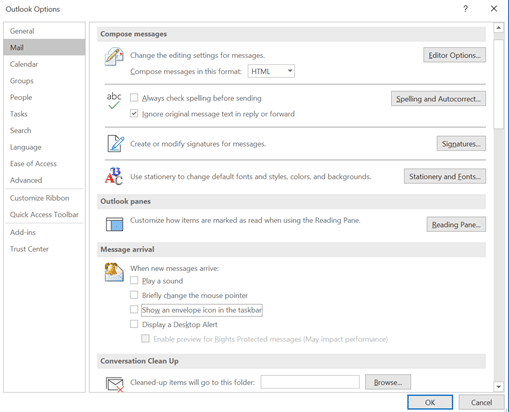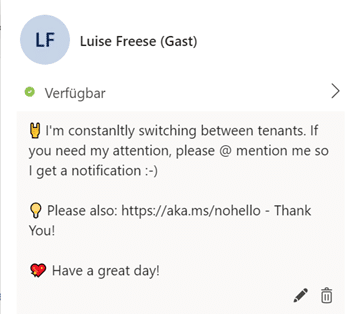Please don’t “hello” me! Why “hello” in Microsoft Teams isn’t polite!
I recently stumbled over nohello.com and aka.ms/nohello, which refers to https://github.com/sbmueller/nohello/blob/master/index.md#please-dont-say-just-hello-in-chat by https://sbmueller.github.io/. The author states very clearly, that just saying “hello” in a chat (at work) and then waiting for the other one to reply is not the best way to act.
After tweeting about it, I found myself in a quite controversial discussion and thought it could be helpful to explain my thoughts in a more persistent way-and with more than just 280 characters.
Why do you “hello” people?
Which purpose could it serve? I asked on twitter, got following answers and I would love to dig a bit deeper into them:
- Being polite/ first greeting the other one
- Seeing if they are available for synchronous chat
- Control, if their status represents their actual work situation
- Control, if you are still on their “VIP” list of people to be always answered first
- Jump the queue, similar to “did you read my email?
- Control if it’s a good time to share confidential information
Let’s have a look why all of them are bad and how there are better alternatives
Being polite
I am sure, you want to be polite. But in chat tools, there is no need to greet the other person like there is no reason to add your signature / contact details. To understand, why we used to do this and why it is not only mot necessary anymore but also harming our colleagues, it’s quite good to understand the roots of this behaviour – as the intention “being polite” seems to be valid and just good.
Greeting is a relict of times in which we tried to translate our analogue world (writing letters) to a digital world (writing emails). We all know, that this worked quite good for communication with customers and partners (externals), as email is just a simple way to exchange text and files if you don’t work together in a collaboration solution (like Microsoft Teams). It evolved into a nightmare within companies (internal), as we developed quite unhealthy habits which were the result of an information hiding culture. As everyone made themselves a bottleneck of knowledge and with glorifying busy (and confusing busy with productive), we came into the habit of forwarding the pressure that we got to the next one in the chain of commands by the devilish trinity of bad behaviour in the workplace:
1. “Did you read my email?”
Throw a stone, if you never said that to a colleague. “Did you read my email” doesn’t mean “Did you read my email”. It can be translated to:
“I gave you a task. And I know that you received it as our mail servers work. But I want you to confirm when you will care about me. So basically, I am jumping the queue and bring you into the position of justifying why you didn’t reply YET.”
Pro Tipp: You can even add some extra flavour when hitting the send button WHILE calling a colleague “did you already see? I sent you an email. What? Didn’t arrive yet? Just refresh!”. It’s the ultimate way to put pressure on others and its totally unproductive at the same time as you interrupt others and force them into task switching, which is energy draining for our brains and leads to slower work while more mistakes occur. Please don’t say it. Don’t even try to “did you read my Teams message?”. Thank you.
2. Checking inbox up to 100 times a day
A lack of purpose in work (we feel disconnected and don’t see the whole picture) leads to a misunderstood sense of duty which results in living in your inbox (doesn’t matter if you call your inbox Outlook or a chat in Teams – if you just put your old ways of working into a new tool, you didn’t win at Digital Transformation!) and checking for new mail in an insane frequency. Of course, this is supported by a default setting in Outlook which gives you a desktop notification for every single mail that you receive.
(ICYMI: you can turn that off:

File à Options à mail àuncheck “display desktop alert” – #EnjoyTheSilence ). Constantly interrupting others and expecting fast response times didn’t help with productivity, just with staying busy.
3. Being the bottleneck / abusing mail /messages for task management
The “my knowledge is my power” approach doesn’t come at no costs. Not only that sharing knowledge is beneficial for the whole company, it’s just time consuming, if we try to hide information and act like the gatekeeper to – for instance – a project status. If we don’t share information, we will always be busy with individually answering questions. I wouldn’t call this very efficient working behaviour. You can see, that a lot with people abusing mail or messages (again, doesn’t matter if you show this behaviour in Teams!) for task management, because they misunderstand what “polite” means. It’s is not polite, to “ask” your colleagues to accomplish a task that they are responsible for. It gives them – additionally to their task, the task to manage this task accordingly. Assigning the task in a task management system (like Planner) handles responsibilities quite effective. A task has some properties which can easily answer the most common question around this task like
- “whom is it assigned to?”,
- “which category does it belong to?”
- “in which bucket will I find it?”
- “when is the due date?” and
- “what is the status of this task?”
WITHOUT sending mails/messages back and forth. So your so-called politeness resulted in more work for you and others. I would call that a waste of time. If you now say: “But what if we need to exchange our views and really have a conversation?” Then, please consider that a synchronous scheduled conversation (in chat or call) might be the better approach.
Polite to means:
- Not causing extra work
- Not putting pressure on me
- Sharing your knowledge
As this behaviour will be beneficial for me. Sticking to old behaviours and not being willing to transform and evolve how we work is not polite, its just very yesterday and fa sign of a mixed mindset.
Looking, if the other one has time for a synchronous chat
Asking “Hey, do you have 10 minutes to give me an update regarding Project Deathstar” is at least a bit more specific, but please keep an eye on a small detail: Those closed questions (that can be answered with yes/no) come often with an expectation to be answered immediately (as it is assumed that it doesn’t take a lot of effort to type 2,3 letters), but we all know, that an interruption will steal way more than just the few seconds of seeing the message and answering it with “no”. It will take up to 20 minutes until you are as focused on the thing you wanted to do before you got interrupted. This lack of focus and the quality of your work and your wellbeing are tightly connected
Means: The more interruptions, the less stuff you get done and the more tired you feel.
The more time you can spend on deep work, the more you accomplish and the better you feel.
You already interrupted the other one and perhaps they know that they now need to time to re-focus and give in, answering: No, I wanted to do something else, but as you already interrupted me, shoot”. And perhaps, you already knew this…
If you ask an open question: “when do you have time to talk about Project Deathstar” you will end up with writing back and forth messages about the best time… If there only was a good way to schedule meetings… Oh wait, there is!
- Outlook Calendar can show the availability of your colleagues, you can also use FindTime and Microsoft Bookings (this is what I do and it works like a charm!)
- You can learn a lot about your co-workers availability by just reading their status. It works like a traffic light, a concept that we are already familiar with.
Control, if their status really represents their work situation / if you are still their VIP
If my status is “busy” and you ask me, if I am REALLY busy, this won’t improve our relationship. It reminds me a bit about sleeping and being asked if I am already/still sleeping. Its an expression of not respecting and not trusting, which is both toxic. Even worse, if your colleagues /managers? Just want to control, if you are still on their “VIP” list of people to be always answered immediately. Leadership doesn’t mean micro-management. As we don’t want to repeat mistakes that have their roots in processes from 1910 ( Henry Ford), we also need to evolve leadership and learn to trust our employees. Especially in #wfh times its just disrespectful to check, if your team members are “still” working.
Jumping the queue
You possible wrote your question – even @ mentioning them in a channel, perhaps you assigned them a task in Planner or wrote them an email – and now you really think that it is a good idea to write “Hello” in a private chat to check if they respond and if so – ask them when they will answer your question? Please mind, that you are part of the problem and not part of the solution. Jumping the queue is not only disrespectful and showing your colleagues that you don’t trust them, its also counterproductive as it leads to the next interruptions, which… nah, I won’t tell you again… You got this! Just break this vicious circle.
Control if it’s a good time to share confidential information
This one surprised me the most. If I share or duplicate my screen, I am automagically on DND, which means, that I don’t get notifications and don’t expose information unintentionally to my audience. If it’s very common to me, that someone else shares super high-confidential information with me, I don’t let others take a look over my shoulder. I think it’s the recipients responsibility to secure what happens on their screen like we expect everyone to lock their machines once there are not sitting in front of them.
Conclusion
Talk with your team members on a regular basis about the right tools to use and how you want to use them. Educate each others and learn about different expectations regarding working styles and response times. Just because I work crazy hours, doesn’t mean you should as well! A good starting point towards excellent teamwork is to have a collaboration contract. If you are not familiar with that – as your Microsoft 365 Consultant about it – or read this article by my MVP colleagues Loryan Strant and Sue Hanley. Please also read Darrell as a Service’s post about availability– he might have a different approach but I highly recommend it!

TL;DR?
What should you do?
- Don’t “hello” people.
- Setup your status message in Teams
- Share this blog post as often as you can
You May Also Like
Lego & Community – Interviews about building and learning
After some blog posts about Power Apps and my personal Microsoft Graph challenge, I am excited to announce that I will run a Community interview series about Lego. I noticed that there are a lot of …
2019 or How I started to believe in myself
Purpose of this post Someone on twitter asked, what was the one word to describe 2019. As I can’t name just one word, I will need to write an entire blog post to do that. Originally, I didn’t know if …
No email just for the sake of #NoEmail?
When you follow my blogposts, you know that I really don’t like email. Wait a minute, is that true? Do I dislike email? No, not at all. I only feel that the daily and widespread email abuse is not …





